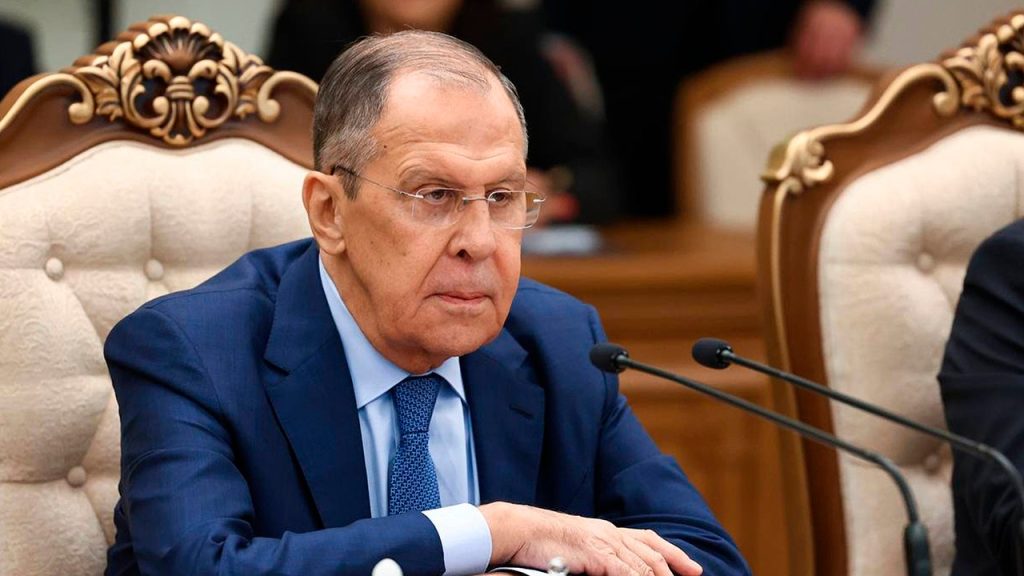Russian Foreign Minister Sergei Lavrov has expressed the Kremlin’s readiness to negotiate a peace deal to resolve the ongoing war in Ukraine, which has continued for more than three years. In an upcoming interview with CBS News, Lavrov agreed with former President Donald Trump on the importance of progressing with discussions between the two nations. However, Lavrov reaffirmed Russia’s stance on critical territorial issues, particularly regarding Crimea, which complicates the peace efforts.
| Article Subheadings |
|---|
| 1) Lavrov’s Statements on Negotiations |
| 2) Trump’s Appeal to Putin |
| 3) The Sticking Point: Crimea |
| 4) Current Status of Peace Efforts |
| 5) Expert Opinions on the Future |
Lavrov’s Statements on Negotiations
In a recent interview excerpt, Sergei Lavrov articulated Russia’s willingness to reach a deal to end the conflict in Ukraine. Lavrov acknowledged that discussions are progressing, echoing Donald Trump’s sentiment that talks between Ukraine and Russia are heading in the right direction. Despite the ongoing violence, Lavrov’s remarks paint a picture of possible diplomatic solutions amid the chaos. These statements are crucial as they mark a potential shift towards a more constructive dialogue between the warring nations, although specifics regarding the agreed terms were not detailed.
Trump’s Appeal to Putin
Former President Donald Trump has not been shy in voicing his opinions about the war in Ukraine, especially condemning Russian strikes on Kyiv. In a recent social media post, Trump urged President Vladimir Putin to cease hostilities, emphasizing the human cost with claims of 5,000 soldiers lost each week. He highlighted the necessity of finalizing peace, saying, “Let’s get the peace deal DONE.” Such statements showcase Trump’s attempts to influence the dialogue surrounding the conflict and underscores his belief that both sides are ready for resolution. His perspective presents an interesting dynamic, especially considering the divided opinions surrounding his approach to international relations.
The Sticking Point: Crimea
A significant obstacle in the negotiation process remains the status of Crimea, which has been under Russian control since its annexation in 2014. Lavrov has reiterated Russia’s position not to relinquish control over the region, which has led to tensions with Ukraine. Ukrainian President Volodymyr Zelenskyy has maintained that Ukraine will not recognize Russian sovereignty over Crimea, a stance supported by Ukraine’s constitution. This conflict of interest raises doubts about whether meaningful negotiations can proceed. Many analysts suggest that any resolution must address the contentious nature of Crimea if stakeholders are to find common ground.
Current Status of Peace Efforts
Experts in foreign policy and conflict resolution are closely observing the evolving situation. While Trump’s administration remains hopeful about the prospect of peace, Putin has yet to formally agree to a comprehensive peace plan proposed by the U.S. During a recent press statement, Trump expressed confidence that both parties are currently inclined towards peace. He urged cooperation from Secretary of State Marco Rubio, reflecting a united front in the U.S. administration’s approach to fostering dialogue. Rubio reiterated the importance of establishing peace, cautioning that the consequences of the ongoing violence underline the urgency of diplomatic discussions.
Expert Opinions on the Future
Many experts remain skeptical about immediate peace possibilities due to the historical mistrust between Ukraine and Russia, compounded by ongoing military actions. The situation underscores complex geopolitical dynamics and raises questions about the sincerity of parties involved in negotiations. Analysts emphasize that despite optimistic narratives from some U.S. officials, the practical challenges of reaching an agreement are daunting. Factors including public sentiment in Ukraine and the broader implications of ceding territory like Crimea make a speedy resolution improbable. Until tangible steps are taken by both sides, especially regarding critical issues, the prospects for lasting peace remain uncertain.
| No. | Key Points |
|---|---|
| 1 | Lavrov states Russia is willing to negotiate a peace deal to end the war in Ukraine. |
| 2 | Trump encourages Putin to halt strikes on Ukraine and push for peace. |
| 3 | The status of Crimea remains a significant hurdle in negotiations. |
| 4 | Experts express skepticism regarding immediate peace due to historical mistrust. |
| 5 | U.S. officials believe both parties are inclined toward a peace resolution. |
Summary
As the war in Ukraine continues to take a toll on both nations, the recent statements by Sergei Lavrov signal a potential willingness from the Kremlin to engage in negotiations. Donald Trump’s appeals to both parties reflect an active interest in achieving peace, yet the deep-rooted issues surrounding territory and sovereignty, particularly concerning Crimea, complicate these discussions. Moving forward, it will take significant diplomatic efforts from all involved to ensure a resolution is reached, but the future remains uncertain as differing interests clash.
Frequently Asked Questions
Question: What role does Crimea play in the conflict between Ukraine and Russia?
Crimea is a significant point of contention, as Russia annexed the region from Ukraine in 2014, which Ukraine and most of the international community do not recognize. This territorial dispute complicates peace negotiations.
Question: How does the international community influence peace negotiations in Ukraine?
The international community, particularly the U.S. and its allies, can influence peace negotiations through diplomatic pressure, economic sanctions on Russia, and providing support to Ukraine. These actions shape the environment in which negotiations occur.
Question: What are the humanitarian impacts of the ongoing conflict in Ukraine?
The ongoing war has resulted in significant humanitarian crises, including displacement of civilians, loss of life, and critical shortages of food and medical supplies. The conflict has created a dire situation for many Ukrainians, necessitating urgent international humanitarian aid.


